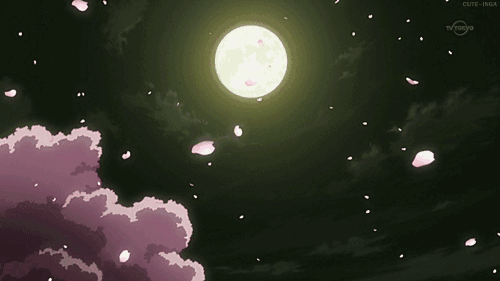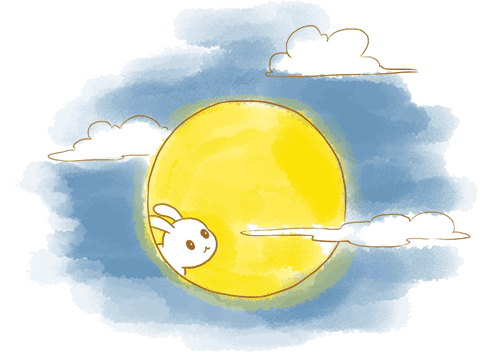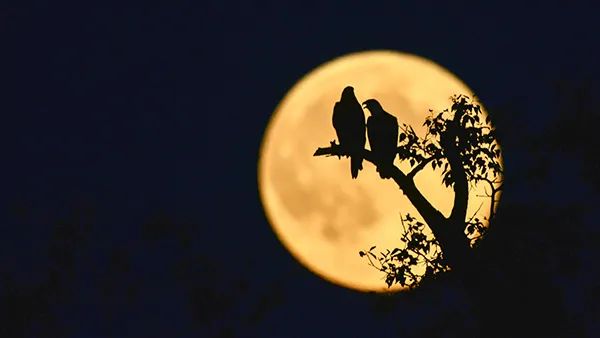话说中国节
你好中国
后羿嫦娥
嫦娥奔月
What is Mid-Autumn Festival?
中秋节是什么?
To the Chinese, Mid-Autumn Festival means family reunion and peace. The festival is celebrated when the moon is believed to be the biggest and fullest. To the Chinese, a full moon is a symbol of prosperity, happiness, and family reunion.
对中国人来说,中秋节意味着团聚、平安。人们觉得,中秋节的月亮最大、最圆。满月象征着繁荣、幸福和团圆。

How the Chinese Celebrate?
中国人怎么过中秋?
Many traditional and meaningful celebrations are held in most households in China, and China's neighboring countries. The main traditions and celebrations include eating mooncakes, having dinner with family, gazing at and worshipping the moon, and lighting lanterns.
大部分中国家庭以及中国的邻国都会举行许多传统的庆祝活动,主要庆祝方式包括吃月饼,吃团圆饭,赏月和点灯笼。
卡片
How Mid-Autumn Started?
中秋节起源
Mid-Autumn Festival has a history of over 3,000 years, dating back to moon worship in the Shang Dynasty (1600–1046 BC). It’s such an important festival that many poems were written about it, stories and legends about the festival are widespread, and its origins have been guessed at and explained by generations of Chinese.
中秋节有三千多年历史,可以追溯到商代时对月亮的崇拜。因为中秋节的重要地位,历代诗人都会为中秋节写诗,关于中秋节的故事、传奇在民间广为流传,中秋节的起源也被历代中国人探究。
The term "Mid-Autumn" first appeared in the book Rites of Zhou (周礼), written in the Warring States Period (475–221 BC). But the term only related to the time and season; the festival didn't exist at that point.
“中秋”一词最早出现在战国时期《周礼》一书中,但是该词只和时间和季节有关,当时还没有中秋节。
In the Tang Dynasty (618–907 AD), it was popular to appreciate the moon. Many poets liked to create poems related to the moon when appreciating it. There is a legend that Emperor Xuanzong of the Tang Dynasty visited the Moon Palace in his dream and heard a wonderful song.
唐代时赏月风靡,诗人在赏月之时佳作连连。据传,唐玄宗曾在梦中去往月宫并听到优美的歌声。
In the Northern Song Dynasty (960–1127 AD), the 15th day of the 8th lunar month was established as the "Mid-Autumn Festival". From then on, sacrificing to the moon was very popular, and has become a custom ever since.
北宋时期,农历八月十五才被正式确立为中秋节,从那以后,为月亮献祭盛行,从那以后便成为风俗。
卡片

月圆之时,我们给大家准备了一些与月亮有关的词汇和短语,希望你在看到天上的明月时,能想起这些有趣的表达。
moon away 虚度时光
over the moon 欣喜若狂
moon-faced 圆脸的
moonhead 笨蛋;傻瓜
moonstruck 发狂的, 神经错乱的
old moon in new moon's arms
新月抱残月(指上弦月出现时,另外半边受地球的反光,隐隐显出圆月的轮廓)
once in a blue moon 极少;千载难逢
pay [offer] the moon 支付一大笔款项
praise above [beyond] the moon
过分颂扬;捧天上
promise somebody the moon
对某人作无法兑现的许诺
shoot the moon
(为避债)乘黑夜搬家
the man in the moon
月中人(指月面的黑斑);假想的人
The moon does not heed the barking of dogs. (=Does the moon care for the barking of a dog?)
“月亮不理狗狂吠”;对无稽责难置之不理。
The moon is a moon still, whether it shines or not.
或明或暗, 月亮总是月亮。
The moon is not seen where the sun shines.
太阳一出,月亮失色;小巫见大巫。
中
秋


发表评论